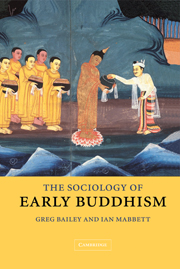Book contents
- Frontmatter
- Contents
- Acknowledgements
- List of abbreviations
- Introduction
- 1 The problem: asceticism and urban life
- CONTEXT
- 2 The social elite
- 3 Economic conditions
- 4 Urbanization, urbanism and the development of large-scale political structures
- 5 Brahmins and other competitors
- 6 Folk religion and cosmology: meeting of two thought worlds
- MEDIATION
- Conclusion
- Bibliography
- Index
6 - Folk religion and cosmology: meeting of two thought worlds
Published online by Cambridge University Press: 22 September 2009
- Frontmatter
- Contents
- Acknowledgements
- List of abbreviations
- Introduction
- 1 The problem: asceticism and urban life
- CONTEXT
- 2 The social elite
- 3 Economic conditions
- 4 Urbanization, urbanism and the development of large-scale political structures
- 5 Brahmins and other competitors
- 6 Folk religion and cosmology: meeting of two thought worlds
- MEDIATION
- Conclusion
- Bibliography
- Index
Summary
The image of Buddhism which has been inherited from past cultural perceptions is dominated by the austere and authoritative figure of the monk; and this image of practice is supplemented by a virtuoso tradition of spiritual cultivation. This tradition is embodied in a rigorous set of intellectual propositions about the mind, the world and action, alongside rigorous meditational techniques to plumb the deepest truths.
Of course, there is much in it that belies the real character of Buddhism in history, and it is increasingly contested. It is true that the act of becoming a monk can be seen as a cutting off of all the intellectual, social and economic ties that would bind a person, and that vipassanā meditation in particular may be seen as a method of reversing acculturalization. But a Leitmotif of our discussion so far has been that the Buddhist monks and laity inhabited a range of thought worlds and cultural milieux. Acceptance of the Buddha's intellectual message, however qualified, did not automatically mean rejection of the totality of the thought world into which one was born, and which was embodied in one's habitus. Even if some monks managed successfully to become single-minded in their religious pursuits, they were still required to deal, often daily, with others who had not and did not wish to.
The Pāli texts are absolutely filled with references to other meaning systems competing within the same cultural arena.
- Type
- Chapter
- Information
- The Sociology of Early Buddhism , pp. 138 - 158Publisher: Cambridge University PressPrint publication year: 2003



